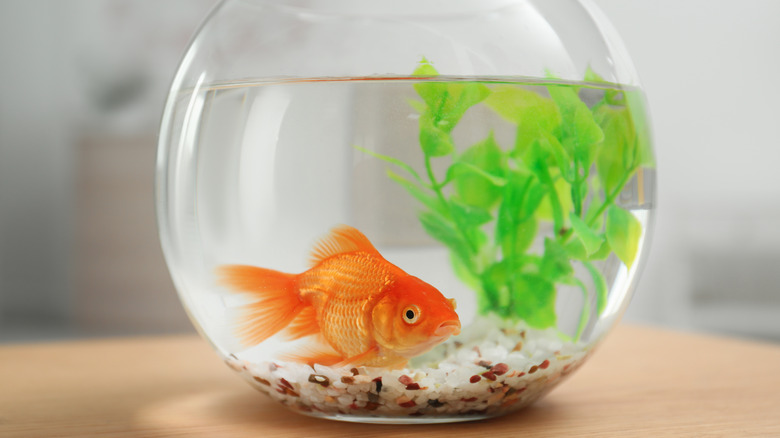Understanding the Question: Can You Eat Goldfish?

Can You Eat Goldfish Before diving into whether eating goldfish is safe or wise, let’s look at what a goldfish actually is. Goldfish (scientific name: Carassius auratus) belong to the carp family and were first domesticated in ancient China more than a thousand years ago. They were bred for their bright colors, graceful fins, and peaceful nature — not for human consumption.
So, technically speaking, yes, you can eat goldfish, but it’s not recommended. Goldfish are small, bony, and often filled with parasites or bacteria — especially those raised in home aquariums or ponds.
Where Did Goldfish Come From?
Goldfish have an interesting backstory. They didn’t start out as pets in glass bowls. Originally, they were bred from a wild species of carp found in East Asia. Ancient Chinese fish breeders noticed some carp had bright golden or red coloring and started selectively breeding them.
Over time, these vibrant fish became a symbol of good luck, prosperity, and harmony. They eventually spread to Japan, Europe, and the rest of the world — not as food, but as ornamental pets.
| Fact | Detail |
| Origin | Ancient China (around 960 AD) |
| Species | Carassius auratus |
| Family | Cyprinidae (Carp family) |
| Lifespan | 10–20 years (in proper care) |
| Purpose | Ornamental and symbolic, not culinary |
Are Goldfish Edible? Technically Yes, But Should You?
When it comes to the question, “Can you eat goldfish?” the technical answer is yes — goldfish are biologically edible. However, they’re far from a good choice for food.
Let’s break it down:
- Texture and Taste: Goldfish have a muddy, bitter flavor due to their diet, which mostly consists of algae, flakes, and plant matter. They’re also small and bony, making them hard to prepare and eat.
- Health Risks: Goldfish from aquariums or ponds can carry parasites, bacteria, or harmful chemicals. Eating them raw or undercooked could lead to severe stomach infections or food poisoning.
- Ethical Concerns: Since goldfish are commonly seen as pets, eating them can feel morally questionable to many people — similar to eating a cat or dog in some cultures.
Why Eating Goldfish Isn’t Safe
Here’s where things get serious. While the question “Can you eat goldfish?” sounds funny or harmless, the act itself can pose real health dangers.
1. Parasites and Bacteria:
Goldfish can carry harmful organisms such as Salmonella, Aeromonas, or intestinal worms. These thrive in unclean tank water and can infect humans if the fish is consumed.
2. Toxic Chemicals:
Most pet goldfish are raised in tanks treated with chemicals or medications to prevent disease. These substances, if ingested, can be toxic to humans.
3. Risk of Foodborne Illness:
Eating raw or undercooked goldfish can lead to nausea, vomiting, diarrhea, and even more serious conditions like fish tapeworm infection (Diphyllobothriasis).
So, while you can eat goldfish, doing so is like inviting a stomachache — or worse — to dinner.
What Does Goldfish Taste Like?
Curiosity makes people wonder about the flavor. Some have even tried goldfish (especially during internet challenges — not recommended!). Most who’ve tasted them describe the experience as:
- “Muddy” or “Earthy” – because they eat algae and live in stagnant water.
- “Bony and Chewy” – due to their small size and lack of tender meat.
- “Fishy but unpleasant” – not like fresh-caught fish such as trout or tilapia.
In short, goldfish don’t taste good. If you’re after a delicious seafood meal, you’re better off sticking with edible fish like salmon, cod, or catfish.
Is It Legal to Eat Goldfish?
This might surprise you — eating goldfish is not explicitly illegal in most countries. However, there are rules and moral standards to consider.
In some places, animal cruelty laws can apply if the act of eating a live goldfish causes unnecessary suffering. For example:
- In the United Kingdom, it’s illegal under the Animal Welfare Act to cause harm to a goldfish by eating it alive.
- In the United States, laws vary by state, but public acts of consuming live animals can lead to animal cruelty charges.
So, while no one will likely arrest you for eating a dead goldfish at home, Can you eat goldfish still socially frowned upon and ethically questionable.
The Internet and the Goldfish Eating Trend
Believe it or not, there was a bizarre internet trend years ago where people recorded themselves eating live goldfish — often to impress others or gain online attention.
This practice was met with heavy criticism for being cruel and unsanitary. Animal welfare organizations strongly condemned it, reminding people that goldfish are living beings, not party stunts.
The trend has thankfully died out, but it sparked a larger discussion about respect for animals and responsible pet ownership.
Cultural and Historical Views on Eating Goldfish
Historically, goldfish were never meant to be eaten. In Chinese culture, goldfish symbolize luck, wealth, and harmony. Eating one is considered highly disrespectful, as it’s believed to bring bad fortune.
In the West, goldfish are primarily seen as gentle, decorative pets — often a child’s first pet. The idea of eating them feels unnatural and emotionally uncomfortable for many.
So, while technically edible, goldfish carry more cultural and emotional value than culinary appeal.
What Happens If You Eat a Goldfish by Accident?
Let’s say, hypothetically, someone ate a small piece of goldfish without realizing the risks — what happens next?
Here’s what you can expect:
- Mild Symptoms: Upset stomach, nausea, or vomiting may occur due to bacteria.
- Severe Cases: If the fish was contaminated, the person could develop food poisoning or intestinal worms.
- Medical Advice: Anyone who accidentally consumes raw or live goldfish should seek medical attention immediately.
Can you eat goldfish always better to err on the side of caution — your health is worth far more than a moment of curiosity.
Better Alternatives: Edible Fish That Are Safe and Delicious
Instead of wondering “Can you eat goldfish?”, focus on fish that are safe, nutritious, and flavorful. Here’s a quick table of great edible fish alternatives:
| Fish Type | Flavor Profile | Nutritional Benefits |
| Salmon | Rich and buttery | High in Omega-3, Vitamin D |
| Tilapia | Mild and tender | Low fat, high protein |
| Tuna | Meaty and flavorful | Iron-rich, great for heart health |
| Cod | Light and flaky | Low calorie, lean protein |
| Trout | Earthy but pleasant | Omega-3, Vitamin B12 |
These options are easy to find, safe to cook, and taste worlds better than a goldfish ever could.
Expert Opinion: What Scientists and Chefs Say
Scientists and culinary experts agree that goldfish should never be eaten. Can you eat goldfish why:
- Biologists point out that goldfish are bred for beauty, not food. Their genetic makeup and environment make them unfit for eating.
- Chefs emphasize that goldfish lack edible value — they have little meat and an unpleasant taste.
- Veterinarians warn about diseases transferable from aquarium fish to humans, especially through raw consumption.
Simply put: goldfish belong in water, not on your plate.
Final Thoughts: Can You Eat Goldfish?
So, back to our golden question — Can you eat goldfish?
The short answer is yes, but you really shouldn’t. While goldfish are technically edible, eating them is unsafe, unethical, and entirely unappetizing. They’re beloved pets, not pantry items.
Instead of treating goldfish as food, appreciate them for what they truly are — symbols of peace, beauty, and good fortune. There are countless safe and delicious fish to enjoy, so let’s leave our shiny friends swimming happily where they belong.
You may also read
Understanding What “Football Night in America Hosts” Really Means





